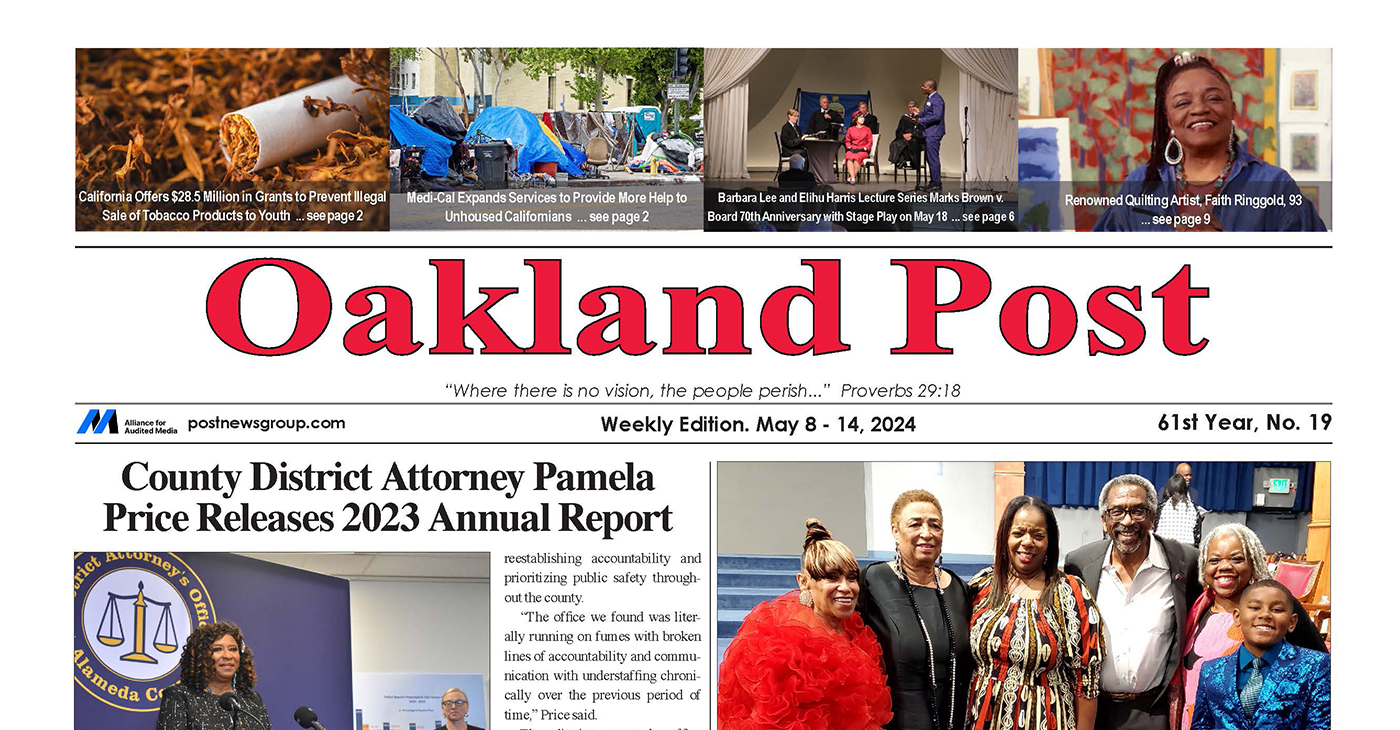Black History
COMMENTARY: Divisions Set in Concrete and Pavement
The racial divisions that have split our country for centuries don’t just live in people’s hearts and heads. Some of them exist in concrete and pavement running right through certain neighborhoods. They are structural racism in the most tangible sense.

By Ben Jealous
The racial divisions that have split our country for centuries don’t just live in people’s hearts and heads. Some of them exist in concrete and pavement running right through certain neighborhoods. They are structural racism in the most tangible sense.
In Milwaukee last month, local activists told me about their fight against that kind of division. Wisconsin’s transportation department wants to expand a crumbling 3.5-mile stretch of Interstate 94 running through the state’s largest city at a cost of $1.2 billion and about 49 acres of land in the neighborhoods adjoining the roadway.
Like Overton in Miami, East Los Angeles and West Montgomery, Alabama, those neighborhoods, home to poor black and brown residents, were subdivided 60 years ago when I-94 was built. The highway continues to cut them off today.
It’s disingenuous to make plans today that don’t consider the history of these highways in places like Milwaukee. The cost to locate interstates, built as courts were ordering desegregation of public schools and housing, was borne by communities of color whose residents were barred from home loans that would have let them move to suburbs that got disproportionate benefit from faster commutes. Planners used code words like blight, renewal, and efficiency to confuse that reality.
A highway project like this creates an actual intersection between creating more equitable communities and protecting the planet. Public works projects that encourage more traffic increase air pollution that impacts our climate, increase noise pollution, and add to flooding and contaminated run-off that damage swimmable, fishable rivers. Those who live closest breathe the most exhaust and live with the constant drone of traffic, but the environmental impact unquestionably stretches far wider.
The estimated cost of expanding I-94 is about $40 million more than fixing the existing six lanes. That’s the same amount that a 50% cut in the current state budget cost mass transit systems in Madison and Milwaukee. Most Milwaukee mass transit riders are workers riding to a job or the disabled and seniors who no longer drive. While black and brown riders make up a disproportionate share of the total, most riders are white.
When we see these fabricated divisions, the question we should ask is who benefits from creating them? We know from troubling experience that the self-interested find ways to separate us even when our interests are the same. Who benefits from a wider interstate? It’s clearly not its neighbors. Not the Milwaukee City Council who opposed the plan. Not drivers today or in years to come as updating the current highway without adding lanes will improve safety and reduce congestion. And not millennials that Wisconsin has spent millions to retain and attract who say they want to live in places that don’t demand driving.
A local issue like this one in Wisconsin matters even if you live three states away because one like it may be coming to where you live soon. We’re on the cusp of many more in every state. Historic federal funding in 2021 and 2022 to repair infrastructure and invest in a cleaner economy must be spent place by place. We need to follow the example of the folks I met in Milwaukee — stay vigilant, never assume that decisions will be made in the best interest of everyone or the planet, build the biggest coalitions we can, and hold officials accountable when we vote.
Ben Jealous is the incoming executive director of the Sierra Club, the oldest and most influential grassroots environmental organization in the country. He is a professor of practice at the University of Pennsylvania and author of “Never Forget Our People Were Always Free,” published in January
Activism
Oakland Post: Week of May 8 – 14, 2024
The printed Weekly Edition of the Oakland Post: Week of May May 8 – 14, 2024

To enlarge your view of this issue, use the slider, magnifying glass icon or full page icon in the lower right corner of the browser window. ![]()
Activism
S.F. Black Leaders Rally to Protest, Discuss ‘Epidemic’ of Racial Slurs Against Black Students in SF Public School System
Parents at the meeting spoke of their children as no longer feeling safe in school because of bullying and discrimination. Parents also said that reported incidents such as racial slurs and intimidation are not dealt with to their satisfaction and feel ignored.

By Carla Thomas
San Francisco’s Third Baptist Church hosted a rally and meeting Sunday to discuss hatred toward African American students of the San Francisco Unified School District (SFUSD).
Rev. Amos C. Brown, president of the San Francisco NAACP and pastor of Third Baptist Church, along with leadership from local civil rights groups, the city’s faith-based community and Black community leadership convened at the church.
“There has been an epidemic of racial slurs and mistreatment of Black children in our public schools in the city,” said Brown. “This will not be tolerated.”
According to civil rights advocate Mattie Scott, students from elementary to high school have reported an extraordinary amount of racial slurs directed at them.
“There is a surge of overt racism in the schools, and our children should not be subjected to this,” said Scott. “Students are in school to learn, develop, and grow, not be hated on,” said Scott. “The parents of the children feel they have not received the support necessary to protect their children.”
Attendees were briefed last Friday in a meeting with SFUSD Superintendent Dr. Matt Wayne.
SFUSD states that their policies protect children and they are not at liberty to publicly discuss the issues to protect the children’s privacy.
Parents at the meeting spoke of their children as no longer feeling safe in school because of bullying and discrimination. Parents also said that reported incidents such as racial slurs and intimidation are not dealt with to their satisfaction and feel ignored.
Some parents said they have removed their students from school while other parents and community leaders called on the removal of the SFUSD superintendent, the firing of certain school principals and the need for more supportive school board members.
Community advocates discussed boycotting the schools and creating Freedom Schools led by Black leaders and educators, reassuring parents that their child’s wellbeing and education are the highest priority and youth are not to be disrupted by racism or policies that don’t support them.
Virginia Marshall, chair of the San Francisco NAACP’s education committee, offered encouragement to the parents and students in attendance while also announcing an upcoming May 14 school board meeting to demand accountability over their mistreatment.
“I’m urging anyone that cares about our students to pack the May 14 school board meeting,” said Marshall.
This resource was supported in whole or in part by funding provided by the State of California, administered by the California State Library via California Black Media as part of the Stop the Hate Program. The program is supported by partnership with California Department of Social Services and the California Commission on Asian and Pacific Islander American Affairs as part of the Stop the Hate program. To report a hate incident or hate crime and get support, go to CA vs Hate.
Activism
Oakland Post: Week of May 1 – 7, 2024
The printed Weekly Edition of the Oakland Post: Week of May 1 – 7, 2024

To enlarge your view of this issue, use the slider, magnifying glass icon or full page icon in the lower right corner of the browser window. ![]()
-

 Community4 weeks ago
Community4 weeks agoFinancial Assistance Bill for Descendants of Enslaved Persons to Help Them Purchase, Own, or Maintain a Home
-

 City Government1 week ago
City Government1 week agoCourt Throws Out Law That Allowed Californians to Build Duplexes, Triplexes and RDUs on Their Properties
-

 Activism2 weeks ago
Activism2 weeks agoOakland Post: Week of April 24 – 30, 2024
-

 Business4 weeks ago
Business4 weeks agoV.P. Kamala Harris: Americans With Criminal Records Will Soon Be Eligible for SBA Loans
-

 Community4 weeks ago
Community4 weeks agoAG Bonta Says Oakland School Leaders Should Comply with State Laws to Avoid ‘Disparate Harm’ When Closing or Merging Schools
-

 Community3 weeks ago
Community3 weeks agoRichmond Nonprofit Helps Ex-Felons Get Back on Their Feet
-

 Community3 weeks ago
Community3 weeks agoOakland WNBA Player to be Inducted Into Hall of Fame
-

 Community3 weeks ago
Community3 weeks agoRPAL to Rename Technology Center for Retired Police Captain Arthur Lee Johnson


















































